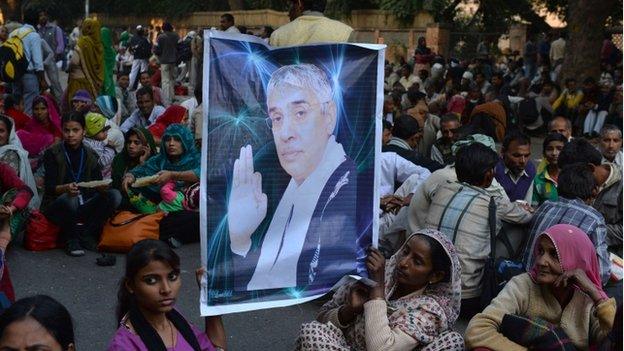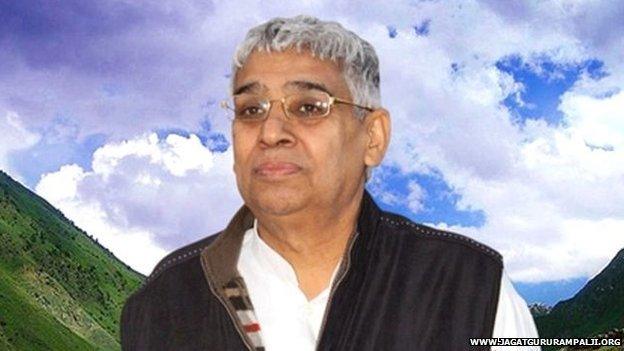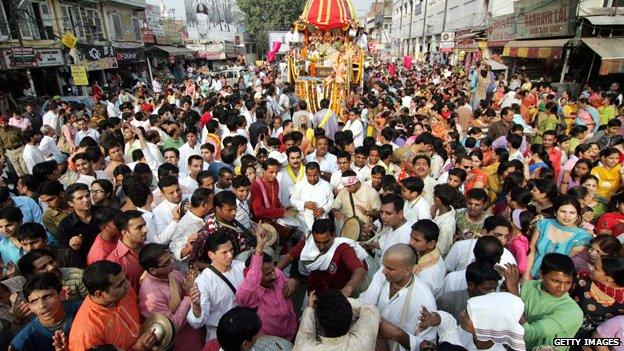Rampal: How did an engineer become a revered guru?
- Published

How did one man rise from the obscurity of working as a junior engineer in local government to amassing tens of thousands of devotees?
BBC News looks at the unusual life and path of Rampal, the self-styled guru, now in a fierce stand-off with Indian police.
Worshipping the monkey god Hanuman
As a child, Rampal Singh, began worshipping the monkey god Hanuman.
.jpg)
The monkey god Hanuman is a popular Hindu deity
Part human-part monkey, Hanuman is a central character in the Hindu epic Ramayana, generally depicted as a man with the face of a monkey and a long tail.
Rampal's website says he recited the Hanuman Chalisa (hymns to the monkey god) seven times a day and went on pilgrimage to a famous Hanuman temple for 18 consecutive years.
But he also paid homage to another God from the Hindu panoply, Lord Krishna. Such faith is necessary for holy men to command respect.
"You were always meeting sadhus and mahatmas [holy men] with the burning desire of attaining God," says his website, which refers to him in the second person - the way one might address a god.
Channelling a 15th Century mystical poet
Rampal also claims to be an incarnation of Kabir, a 15th Century Indian mystical poet.

The exact dates of Kabir's birth and death are uncertain but his legacy is enduring and is revered by both Hindus and Muslims. His poetry draws on both Hinduism and Islam , externaland has an earthy style aware of the grim realities of everyday life.
"When you really look for me,
you will see me instantly —
you will find me in the tiniest house of time."
As word got round of him being an incarnation of Kabir, media reports say, the number of his followers grew.
Born humble, preaching equality
He was born in 1951 to a farming family in Dahana village in India's northern Haryana state. After his diploma in engineering he began work in local government and became a disciple of a seer called Ramdevanand.

He began giving talks to groups of people in 1994. Encouraged by his growing number of devotees, he set up the Satlok Ashram in 1999. A year later Rampal resigned from his government job.
One Rampal supporter Manoj Gothwal, 30, told the BBC how he became a devotee after being encouraged by a family member to read one of his books.
"He [Rampal] says everyone is a good person and everyone is equal and we should respect all. That's something I liked about his teachings."
Pursuing purity, punishing traitors
It grew from there and he now has tens of thousands of devotees in several states.

Dancing is popular at Hindu festivals - but prohibited at Rampal's ashram
His ashram adopted the edicts , externalcommon to many self-styled holy men. He exhorts his followers to avoid "social evils" including:
Alcohol, marijuana and smoking
Meat, eggs
Idol worship
Gambling
Singing and dancing
Rampal claims that "thousands of people have got their chronic illnesses cured" and "ruined families have become prosperous again" after coming in contact with him.
But his website has particularly harsh wards for "traitors", defined as anyone who is hostile or turns away from him. A person who approaches a traitor of a guru, the site says, "will go to hell" in this and future lives.
But missing more than 40 court summons
His website also details a number of cases against the guru. They relate to allegedly fraudulent purchase of land, conflicts with some devotees and an alleged case of murder involving the death of a man at another ashram in Rohtak. He is on bail in this case, having been accused of involvement in the murder.
The ashram dismisses all of these cases as false and fabricated.

Media reports say that Rampal has missed more than 40 court appearances.
Despite this, thousands of supporters calling themselves "Baba's army" have fought police tooth and nail with their home-made weapons.
- Published19 November 2014
